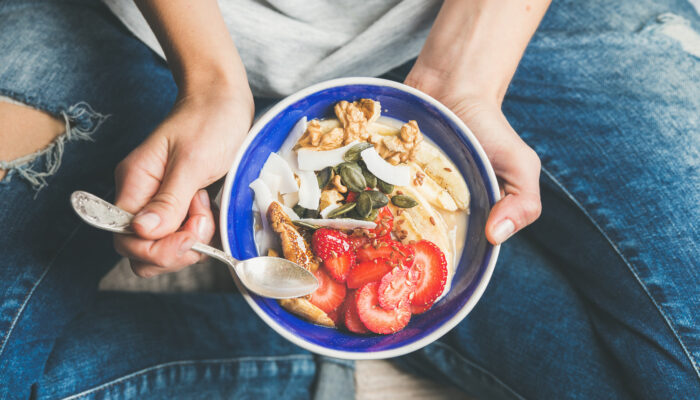Diet And Nutrition For COPD Patients

Diet and nutrition for COPD patients
Chronic Obstructive Pulmonary Disease (COPD) is a term used for several progressive lung diseases like emphysema, chronic bronchitis, and refractory asthma. COPD cannot be cured, but with the right treatment, you can control and manage it to enable yourself to lead a good life.
If you are a COPD patient, it is necessary to eat healthy to keep your immunity strong and fight the symptoms. Eating right is the key to boost your energy, but you may add some comfort food to your diet if you are losing a lot of weight. Those who want to maintain or control their weight can also eat smaller portions of the nutrient-packed food.
- Coping with fatigue while eating
If you feel fatigued while eating or have trouble breathing as you get too full, you can eat smaller quantities more often. So, you can have 4-6 small meals filled with nutrition through the day and cut out the three large meals. This will help you get the required energy from your diet while keeping the symptoms at bay. You are also advised to relax and rest before beginning your meal. - Energetic breakfast
Breakfast is the most important meal of the day, and you ought to ensure that it contains at least 25 to 30 grams of fiber. As COPD can make you feel fatigued later in the day, you should have a healthy meal when you are most energetic, which is in the morning. A bowl of bran cereal and whole wheat toast is a good option to begin your day with.
Oatmeal is another healthy option to have for breakfast. It is rich in fiber, iron, calcium, and vitamin A. Preparing the oatmeal in milk instead of water will add more nutrition. This can also help you shed some weight as the high fiber content in oatmeal allows you to feel full on fewer calories. Add organic honey or berries instead of sweeteners to keep the calorie count low. - High-calorie foods
In cases where you feel fatigued while eating, consume the high-calorie items in the meal first. That being said, do not fill your stomach with mashed potatoes or desserts first, eat lean meat or tofu instead to get protein with each bite. This will prevent fatigue and help you finish your meal without having to stop eating due to breathlessness.
Add natural and organic cheese to meals with potatoes, vegetables, and rice to increase the nutrient and calorie value of the meal. This will give you extra calcium and protect your bones from the side-effects of certain medicines you may take for COPD. You may look for cheeses that are labeled as “part-skim” or “reduced-fat” for a lower calorie count. - Caffeine free fluids
Caffeine free fluids make a great option for keeping the mucus in the airways thin, which helps in keeping the lungs clear. Also, restraining from having fluids during meals will prevent you from feeling full before finishing the meal. If you wish to gain weight, consume more milk to get extra calories, along with calcium and vitamin D to keep your bones strong.
Caffeine is best when avoided if you have COPD as it can interfere with some medicines and cause restlessness and nervousness, which can worsen the symptoms. Avoiding tea, coffee, and caffeinated sodas and replacing them with healthier drinks is a good practice. - High-fiber foods
Finally, consider adding a bowl of split peas or lentil soup to your diet for extra fiber. Add other rich sources of fiber like dry beans, whole-grain cereal, bread, and even fresh fruits and vegetables as they will boost your energy and alleviate the symptoms.





